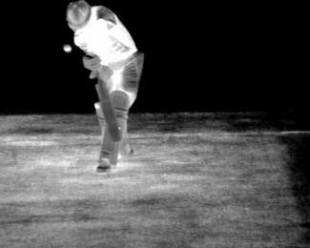|
|
|

Hot Spot: What the umpire will see
© Sky Sports
|
|
| |
The ICC has announced that
Hot Spot images will be available for use as part of its ongoing technology trial during the second and third Tests in South Africa. The system will be available to the third umpire in the event of a player referral.
Hot Spot uses two infra-red cameras positioned at either end of the ground. These cameras sense and measure heat from friction generated by a collision, such as ball on pad, ball on bat, ball on ground or ball on glove. A black-and-white negative image of the incident is generated into a computer which shows the ball's precise point of contact.
Only last week, ICC match referee Alan Hurst dismissed suggestions that Hot Spot would be used in trials, arguing that there were only three such systems available to broadcasters in the world.
"By having 'Hot Spot' available it means the television official will have even more information at his disposal if he is called upon, via a request for a review, to assist the on-field umpires with a decision and that has to be a good thing," said ICC general manager - cricket, David Richardson. "It also means that when the ICC cricket committee meets in May to consider the issue of the technology trial it will have a much more complete picture of the aids available for use and whether, and if so how well, they worked in a match situation.
"We hope Hot Spot can play a part over the next two Tests in Durban and Cape Town in establishing whether technology has a role to play in helping achieve those aims."
However, the row over the exact role of the third umpire in referrals resulting from a series of controversial decisions in the Barbados Test has hardly endeared the system to the public, and none of those would have been influenced in any way had Hot Spot been available.
Hot Spot uses technology developed in the military for tank- and jet-fighter tracking. The technology was adapted for television by BBG Sports, the Australian company responsible for the Snickometer, in conjunction with Sky Sports. Channel Nine producer Steve Crawley described Hot Spot as "100% backed up by science", as opposed to other applications.

